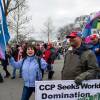“I hope the truckers do come to America and I hope they clog up cities,” Trumpist Kentucky Sen. Rand Paul declared. And he’ll probably get his wish.
If ambulances, fire trucks, and other essential services are gridlocked for extended periods, if factories are shut down and workers laid off because of additional supply chain disruptions, that’s apparently what Paul considers the acceptable cost of an essential civil rights protest.
How differently would Paul react to a convoy of Black Lives Matter protesters clogging up cities and bringing public life to a standstill? He likened a group of peaceful BLM protesters to a “crazed mob” when some yelled at him, while he was safely under police escort.
Of course, he’s not alone in his hypocrisy. Trumpists who praise the Canadian truckers who occupied Ottawa and closed off access to essential international bridges for weeks have loudly condemned less disruptive BLM protesters as terrorists. Last year, in the wake of BLM protests, Trumpist Florida Governor and presidential aspirant Ron DeSantis proudly signed expansive “anti-riot” legislation including a ban on “Willfully obstructing the free, convenient, and normal use of a public street, highway, or road by impeding, hindering, stifling, retarding, or restraining traffic or passage by standing on or remaining in the street, highway, or road, endangering the safe movement of vehicles or pedestrians.” It should be needless to point out that DeSantis strongly supports the trucker’s “Freedom Convoy.” Lawlessness for me but not for thee, he might explain.
Do protesters have First Amendment rights to appropriate public streets, occupy public spaces, and obstruct transportation systems and the flow of people and goods for extended periods? Of course not. Rallies, marches, and other public protests have long been subject to non-partisan, non-discriminatory, reasonable time, place and manner restrictions.
But partisans right and left generally recognize the necessity and constitutionality of these restrictions only when applied to their ideological opponents. When their friends and allies take over public spaces, public systems and public life for prolonged periods, they call it civil disobedience — Paul’s tribute to trucker convoys. “Civil disobedience is a time-honored tradition in our country,” Paul declared, inviting truckers to occupy America’s roads and cities. Over a decade ago, Occupy Wall Streeters wrongly claimed they were engaged in civil disobedience when they appropriated public parks in much smaller, much less disruptive protests of income inequality.
Both sides imagine that protesting under the banner of civil disobedience immunizes them from arrest or punishment for illegal actions. Both sides are wrong. Civil disobedience is not simply a willingness to break laws you consider unjust. It includes a commitment to suffer the punishment for law breaking, in order to dramatize the law’s injustice and hasten its change. “One who breaks an unjust law must do so openly, lovingly, and with a willingness to accept the penalty,” Martin Luther King Jr. explained in his famous Letter from a Birmingham Jail. “I submit that an individual who breaks a law that conscience tells him is unjust, and who willingly accepts the penalty of imprisonment in order to arouse the conscience of the community over its injustice, is in reality expressing the highest respect for law.” In his classic defense of civil disobedience, Henry David Thoreau exhorted his reader to “Let your life be a counter-friction to stop the machine.” Thoreau was not an activist. He felt no obligation to “devote” himself to eradicating wrongs. But he did not want to be complicit in them. The monstrous wrong of his day was slavery, so he famously refused to pay taxes to Massachusetts because it belonged to a union of slave-holding states and recognized the legal prerogatives of slaveholders. He willingly went to jail but spent only one night there because someone paid his taxes for him — with no thanks from Thoreau.
Of course, most of us would have happily walked out of jail. Most of us lack the commitment, altruism and un-wielding integrity to meet the high standards set by Thoreau and King. Most of us do not volunteer for punishment when we regularly (and sometimes unavoidably) break the multitude of laws that are supposed to govern our daily lives.
I’m not suggesting that you should turn yourself in every time you attend an unpermitted protest. But the more disruptive, prolonged and uncivil your protest, the more it appropriates public spaces and systems, subsuming public life, the more you should acknowledge and hold yourself accountable for its costs. Civil disobedience is not an exercise of rights so much as an assumption of social responsibilities.
Wendy Kaminer, a lawyer and author of eight books, is a former member of the boards of the American Civil Liberties Union of Massachusetts and the national American Civil Liberties Union.







